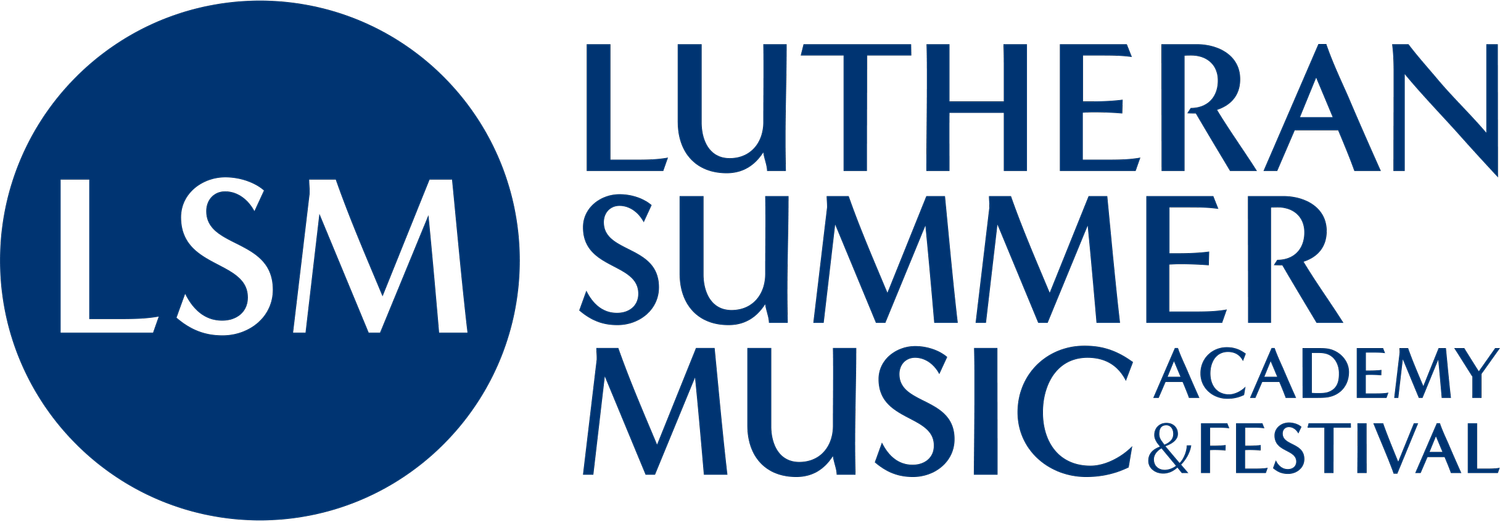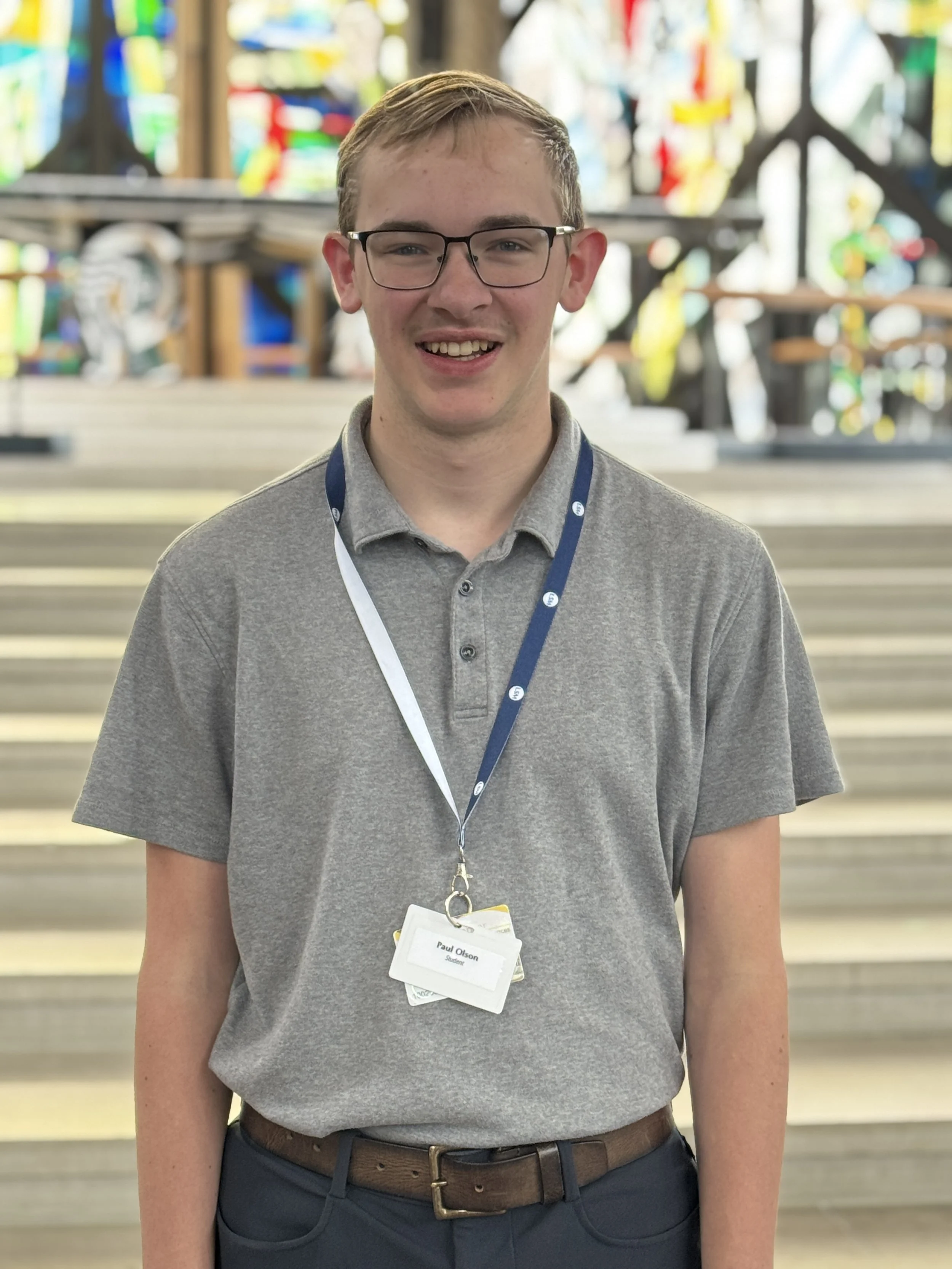2025 Carl Schalk Honoree Interview
Paul Olson from Casper, Wyoming.
Lutheran Summer Music is pleased to present the recipient of the 2025 Carl Schalk Award: Paul Olson from Casper, Wyoming.
Carl Schalk was a teacher, musicologist, composer, and author whose legacy as a Distinguished Professor of Music Emeritus at Concordia University, River Forest, Illinois, has nurtured generations of church musicians. Dr. Schalk also was deeply connected to Lutheran Summer Music, from its earliest days, to composing the arrangement of “Luther’s Morning Prayer” that the LSM community sings daily during the summer program. LSM has established this award in his name to recognize students who embody the same passion for church music, and by their desires to use their musical gifts to the service of the church.
Paul attended LSM 2025 as a second-year organ student, after graduating from Mount Hope Lutheran School, and spending a lifetime learning Lutheran hymnody and theology through his home congregation and from his family (his father is a Missouri Synod pastor). Paul first heard of LSM through his mother, Emily, who attended LSM herself in 1999 (Emily Elsea).
To make LSM financially possible for his family, Paul launched his own “Hymn Pledge Project,” to thank members of his church and community for contributing toward his LSM tuition. Paul gave contributors a list of hymns to vote for, offering selections from the current LSB (Lutheran Service Book) and the classic TLH (The Lutheran Hymnal). After receiving pledges, Paul recorded and shared improvisations on the top three hymns for all contributors to enjoy.
As a student at LSM 2025, Paul studied organ as his primary instrument, and voice as his secondary instrument, taking voice lessons and singing in the Festival Choir, and also played in the LSM Handbell choir.
We asked Paul some questions to reflect on his experience at LSM and his music ministry:
How do you pursue church music at home, or in your home congregation?
I pursue church music in my congregational activities, which include the church choir, and being a regular organist and occasional kantor. I also play hymns and sing with my family at home. Hymns are awesome! They're great sources of Christian confession, and besides that, they've given me a lot of material for improv, which is something I really enjoy.
How did you pursue church music at LSM 2025?
Paul at LSM 2025.
I pursued church music at LSM through private lessons with Dr. Catherine Rodland and Dr. David Cherwien for organ and Daniel Greco for voice. Dr. Cherwien spent time with me working on hymnody and improvisation. He gave me insights and things to practice that I didn't expect I could have received from anyone or anywhere else. His knowledge far transcends mine, but I hope that what he has given me just in the short month we worked together I am able to use readily as I continue in music, and church music in particular. Dr. Rodland was also a really excellent teacher and gave me instruction in technique for Baroque pieces that I will play in church. I learned a lot from her. My secondary lessons in voice helped me in singing expressively, which will help me as a kantor. Singing in the Festival Choir with Dr. Shannon Gravelle also gave me valuable choral experience that will translate to church choir. I also loved playing handbells with Dr. Jeff Doebler in different church services.
What is important to you about the music of the church?
Christians should always remind ourselves for what reason we have music in the church. Lutherans like to ask the question, "What does this mean?" and this helps us focus on why we do what we do. So music in the church should confess what God says about Himself because that's what Christians do: confess their faith and point to Christ. Music in the church should also give all glory to God. As Luther wrote, "We are beggars; this is true." We should remember the One who gave us everything, including music, and music in the church, whether it's playing the organ, or singing a solo, or any number of ways of serving, it is all to God's glory and not ours.
How do your LSM experiences support your musical growth, and your connection to church music?
LSM has given me practical habits for practicing and playing for church. As I said, I learned a lot from Dr. Cherwien this year, but also I'm hoping that in the future my home congregation will acquire handbells, which I had my first opportunity to play at LSM. In fact, playing in the handbell ensemble at LSM this year was like a bonus on top of so many other great experiences. As I mentioned above, I will continue as organist at my church and other churches as needed, and I hope to continue improving as a church musician generally.
Do you plan to continue to pursue church music, and if so, what are your goals or hopes for your future?
I will certainly continue, as I said before, as organist and as a singer in the church choir and sometimes as a kantor. I'd like to become a church choir director eventually. I will also be studying church music at Luther Classical College through the general Liberal Arts track. I want to be a church musician all my life, whether full time or not. And I hope that above all I am reminded of God's grace in giving us music, one of his greatest gifts. Soli Deo Gloria
After two summers at LSM and graduating from LSM, Paul has now concluded his time as a student. We wish him well on his future endeavors, especially in church music and music ministry.
In addition to honoring an individual in Dr. Schalk’s name, LSM has established the Dr. Carl Schalk Endowment Fund to support students like Naomi who continue Dr. Schalk’s legacy, and in the promise that the future of music and the Church which he served so faithfully will be preserved through the training and nurturing of young people.
Click below to learn more and support the Dr. Carl Schalk Endowment Fund.



